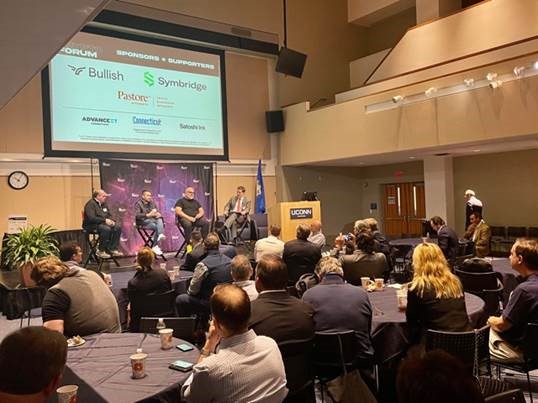Pastore LLC represented one of the Nation’s largest investment banks before the Third Circuit on a case involving the scope of a bankruptcy court’s subject matter jurisdiction. White & Case represented an issuer of private debt, arguing that bankruptcy court subject matter jurisdiction extends to disputes involving a reorganized debtor. Law 360 has issued several articles regarding this matter. In addition to handling this appeal, Pastore LLC has won Appeals at the Eighth Circuit (Rights holders in a merger) and Second Circuit (Hedge Fund investments) over the last year.
Category: News
The Modernized Marketing Rule for Financial Advisers
On November 4, 2022, compliance with the amendments to the advertising and cash solicitation rules in Rule 206(4)‑1 under the Investment Advisers Act of 1940 (Marketing Rule), which the Commission issued on December 22, 2020 will become mandatory.
Since the advertising and cash solicitation rules were adopted (Rule 206(4)-1 in 1961 and Rule 206(4)-3 in 1979, respectively) the advent of the internet and social media, among other things, has dramatically changed the landscape of marketing professional services. The Marketing Rule is designed to modernize rules that govern investment adviser advertisements and payments to solicitors, replacing the broadly drawn limitations and prescriptive or duplicative elements in the previous rules with more principles-based provisions, as described below.
Definition of Advertisement. The amended definition of “advertisement” contains two prongs:
- The first prong captures communications traditionally covered by the advertising and includes any direct or indirect communication an investment adviser makes that: (i) offers the investment adviser’s investment advisory services with regard to securities to prospective clients or private fund investors, or (ii) offers new investment advisory services with regard to securities to current clients or private fund investors. The first prong of the definition excludes most one-on-one communications.
- The second governs solicitation activities previously covered by the cash solicitation rule and includes any endorsement or testimonial for which an adviser provides cash and non-cash compensation directly or indirectly (e.g., directed brokerage, awards or other prizes, and reduced advisory fees).
General Prohibitions. Under the Marketing Rule, the following advertising practices are prohibited:
- making an untrue statement of a material fact, or omitting a material fact necessary to prevent making the statement misleading;
- making a material statement of fact that the adviser does not have a reasonable basis for believing it will be able to substantiate;
- including information that would reasonably be likely to cause an untrue or misleading implication or inference to be drawn concerning a material fact relating to the adviser;
- discussing potential benefits without providing fair and balanced treatment of any associated material risks or limitations;
- referencing specific investment advice provided by the adviser that is not presented in a fair and balanced manner;
- including or excluding performance results, or presenting performance time periods, in a manner that is not fair and balanced; and
- including information that is otherwise materially misleading.
Testimonials and Endorsements. The Marketing Rule prohibits the use of testimonials and endorsements in an advertisement, unless the adviser satisfies certain disclosure, oversight, and disqualification provisions:
- Disclosure. Advertisements must CLEARLY and PROMINENTLY disclose whether the person giving the testimonial or endorsement (the “promoter”) is a client and whether the promoter is compensated. Additional disclosures are required regarding compensation and conflicts of interest. There are exceptions from the disclosure requirements for SEC-registered broker-dealers under certain circumstances. Advisers will no longer need to obtain from each investor acknowledgements of receipt of the disclosures.
- Oversight and Written Agreement.An adviser that uses testimonials or endorsements in an advertisement must oversee compliance with the marketing rule. An adviser also must enter into a written agreement with promoters, except where the promoter is an affiliate of the adviser or the promoter receives de minimis compensation (i.e., $1,000 or less, or the equivalent value in non-cash compensation, during the preceding twelve months).
- Disqualification. Subject to certain exceptions, “bad actors” may not serve as promoters.
Third-Party Ratings. The rule prohibits the use of third-party ratings in an advertisement, unless the adviser provides disclosures and satisfies certain criteria pertaining to how the rating was prepared.
Performance Information Generally. In order to deter the provision of misleading information, the rule prohibits including in any advertisement:
- gross performance, unless the advertisement also presents net performance;
- performance results, unless they are provided for specific time periods in most circumstances;
- any statement that the Commission has approved or reviewed any calculation or presentation of performance results;
- performance results from fewer than all portfolios with substantially similar investment policies, objectives, and strategies as those being offered in the advertisement, with limited exceptions;
- performance results of a subset of investments extracted from a portfolio, unless the advertisement provides, or offers to provide promptly, the performance results of the total portfolio;
- hypothetical performance (which does not include performance generated by interactive analysis tools), unless the adviser adopts and implements policies and procedures reasonably designed to ensure that the performance is relevant to the likely financial situation and investment objectives of the intended audience and the adviser provides certain information underlying the hypothetical performance; and
- predecessor performance, unless there is appropriate similarity with regard to the personnel and accounts at the predecessor adviser and the personnel and accounts at the advertising adviser. In addition, the advertising adviser must include all relevant disclosures clearly and prominently in the advertisement.
If you are an investment adviser, now is the time to ensure your marketing materials comply with the modernized Marketing Rule.
Pastore Cybersecurity Client Defeats Travelers Insurance in Connection with Refusal to Honor Insurance Policies
On June 3, 2022, Pastore LLC won an important motion against Travelers Insurance and several of its affiliates. Pastore LLC is representing a company that provides cybersecurity education that brought an action against its insurance provider for its failure to defend it in a regulatory action, as specified by its insurance policy. Pastore worked to cite in the insurance’s company’s parent corporation and subsidiary and amend the complaint to add claims against the new parties. Pastore was able to show the court that the new parties had participated in the wrongs against its client and should not be allowed to hide behind corporate shell games to avoid liability.
Pastore LLC Welcomes Senior Counsel and Summer Class
On Tuesday, May 31st, Pastore LLC welcomed senior counsel and our summer class to the firm.
Pastore LLC is pleased to welcome Robert Knight as Senior Counsel. Mr. Knight has a wide range of legal experience. Bob was an elected official Municipal Judge serving two four-year terms. Indiana US Senator Richard Lugar, then Mayor of Indianapolis, administered his Oath of Office on each occasion he was elected to office. As Claim Counsel for Aetna Property and Casualty Company, Bob managed national litigation supervising hundreds of trial lawyers and thousands of lawsuits. Bob also as Federal Regulatory Affairs Counsel company spokesperson before federal agencies concerning matters of insurance. As Environmental Coverage Counsel for The Hartford Insurance Company, Bob assisted in structuring the settlement of two five billion dollar aquifer contamination claims. As Special Counsel to Abbott Labs, Bob worked with the principal scientist inventor of Humira documenting patent royalty agreements antecedent to a multibillion Humira patent royalty dispute with Cambridge Antigen Associates in England, co- developer of Humira. Bob is rated a Martindale Hubbell AV Preeminet lawyer where he is ranked in the top 5% of lawyers and American Registry where he is ranked in the top 1% of lawyers in legal ability and ethical standards.
Rachel Neff has returned to office as our Summer Associate. She worked with Pastore as a Law Clerk since September of 2021. She took a break for her finals, a trip home to California, and some time off to enjoy some hiking at our National Parks. She will be full time for the summer.
Stewart Stockdale Jr. joined us as our full time Summer Law Clerk. He completed his first year of law school at the Indiana Maurer School of Law. He graduated from Tufts University in 2019. He spent the two years prior to law school working at Merrill Lynch in White Plains.
Christopher Atuahene joined us as our Summer Law Clerk. Chris completed his first year of law school at New York Law School. He graduated from Southern Connecticut State University in 2020 with a Bachelor’s degree in Philosophy.
Pastore has LLC also welcomed Dan Melillo, as our Summer Law Intern. He finished his Junior year at Skidmore College as a Political Science major with an Education Minor. Dan looks forward to going to Law School upon graduation.
Pastore Sponsors Connecticut Crypto Forum
The Connecticut Crypto Forum has recently been created to advance education and knowledge in this new asset class. The forum will connect large and sophisticated capital pools with leading players and thinkers across the crypto, delfi, and Web 3.0 market to strengthen investor knowledge, understanding, and skill. The mission of the forum is to build a diverse, sophisticated, Connecticut-based community interested in crypto from many angles.
On May 13, 2022, the Connecticut Crypto Forum will be conducting an invite-only session for those interested in the forum to partake in. Pastore LLC is proudly a founder and sponsor of the Connecticut Crypto Forum.
Learn more about Pastore’s Crypto practice



Pastore Calculates RAUM of over $1 Billion for Registered Investment Advisor
This past month, Pastore LLC assisted a registered investment advisor (RIA) with the filing of its Form ADV. In connection therewith the firm assisted the RIA in its calculation of regulated assets under management (RAUM), which totaled over $1 billion. The Securities and Exchange Commission (SEC) uses RAUM as its measurement of assets for registration purposes. However, RAUM has sometimes been misunderstood as representing total assets under management (AUM) for a company, and based on the firm’s experience the SEC itself has sometimes confused RAUM with AUM. RAUM does not include every type of asset that an RIA may manage, and in particular may not include certain real estate investments or investments in portfolio companies controlled by the fund. When assessing the financial condition of an RIA and its funds, it is important to distinguish between the assets counted under RAUM and the assets counted under AUM. An RIA that appears to manage a small volume of assets based on its RAUM may in fact manage a much larger volume of assets based on total AUM.
Joseph M. Pastore III, 2022 New York Metro Super Lawyer
Pastore LLC proudly announces Managing Partner, Joseph M. Pastore III has been acknolwedged on the 2022 New York Metro Super Lawyer List. Mr. Pastore has duly earned this award for his outstanding legal work.
Pastore Files Appeal in New York’s First Department Appellate Division
Recently, Pastore LLC perfected its appeal in New York’s First Department Appellate Division. Pastore LLC represents a celebrity chef in the matter, which involves a contract dispute dealing with election of remedies issues. The chef is well known and has high-end restaurants in New York and Las Vegas, and the issue in the case involves some of his historical publicity. Ultimately, the matter involves sophisticated contractual provisions, and thus the chef hired Pastore LLC to handle these contractual agreements.
Congratulations to Joseph M. Pastore III, Recipient of the 2022 AV Preeminent Rating Award
Pastore LLC proudly announces that for the 12th consecutive year, Martindale-Avvo has awarded the 2022 AV Preeminent Rating to Managing Partner, Joseph M. Pastore III. This honor is the highest possible rating in both legal ability, and ethical standards a practicing attorney can receive. Mr. Pastore has received this honorable award resulting from his dedication to ethical practices, work ethic, and legal abilities he commits to each day as a practicing attorney.
Examiner’s Report Supports Pastore’s Client’s Claims Involving a High-End Westchester Development
Pastore LLC represents a large creditor and owner of a construction management company in a bankruptcy matter in the Southern District of New York where a billionaire filed bankruptcy to avoid liability to his business partner, Pastore LLC’s client, concerning high-end developments in Westchester and Connecticut. Pastore LLC with co-counsel made a motion to have an examiner review the company’s finances. The examiner’s report indicated that he owes millions back to the bankruptcy estate.







